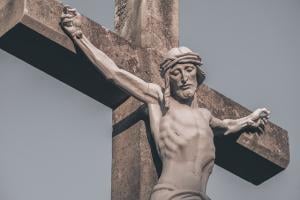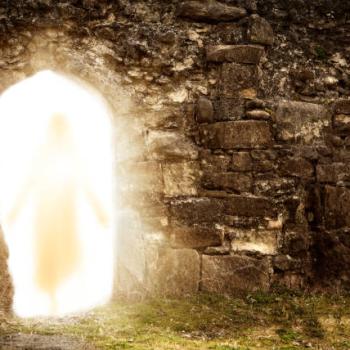
Participating in the reading of Jesus’ passion in yesterday’s Good Friday service and coming to the crowd’s part, I read out loud, “Crucify him! Crucify him!” It’s been like that every Good Friday.
That emotionally disturbing part of Good Friday highlights my guilt, my role in Jesus’ crucifixion. But there’s another reason why this part of the passion story is disturbing. It’s the image of the people, “the Jews,” shouting for Jesus’ death. In the story from John’s Gospel, they even overrule a supposedly benign and reluctant Pilate, who would rather have freed Jesus. It’s an image that has been a driver of anti-Semitism through the Christian centuries.
We need to be as clear as possible about the history of Jesus’ crucifixion. Jews did not kill Jesus.
Say it louder: Jews not to blame for Jesus’ death.
In 1965 the Second Vatican Council declared that the Jewish people, whether of our time or Jesus’, were not responsible for Jesus’ death. Pope Benedict XVI repeated that teaching in his trilogy Jesus of Nazareth.
That message is slow at getting to the people in the pews. Every Good Friday in church we represent “the Jews” as ordering Pilate to crucify Jesus. As a faithful, Bible-believing Catholic, I think we need to get to the point where we can say loudly:
THAT EPISODE IN THE GOSPEL OF JOHN WITH THE CROWD CRYING “CRUCIFY HIM!” DIDN’T HAPPEN!
We need to say it in church in Good Friday homilies and not just hide it away in scholarly tomes and pages from people like me who read books like that. (Books like A Crucified Christ in Holy Week by prominent Catholic scholar Raymond Brown) Catholics need to get straight about Pontius Pilate. History knows him as a despot who cared about his own power and position, not whether he sent the right or wrong person to the cross. Otherwise, we’re failing to correct and even continuing anti-Semitism into yet another millennium.
The Crucifixion: A history
The Roman occupiers and some wealthy, high-placed Judeans had reason to want Jesus out of the way. At trial some witnesses brought three charges against Jesus: He threatened to destroy the Temple, he forbade payment of taxes to Caesar, and he claimed to be king. The first two were close to the mark, but those charges didn’t stick. It’s the third, which was not true, that yielded a conviction. Pilate placed a placard on the cross that said, “Jesus the Nazorean, King of the Jews.”
Blasphemy was not the issue for that small group of Jews. In fact, Jesus didn’t claim to be God or to have divine powers and prerogatives. If he had, the punishment would have been stoning. (Some time later Judeans did stone a follower of Jesus named Stephen.) Jesus didn’t claim the power to forgive sins, for which he could have been charged with blasphemy. He merely said what priests in the Temple said regularly: “Your sins are forgiven.”
That was bad enough for priests and scribes and other Temple officials. Jesus, in effect, told people that God’s grace was available to them through other means than the Temple and without paying the Temple tax. The real issue for these Jews was Temple’s money and power. And the threat Jesus posed to a whole economic system that transferred wealth from the poor to the already rich.
Jesus, a threat to empire
Practically all Palestinians were angry about the taxes and other fees the imperial Roman occupiers exacted. (The wealthy tolerated them well enough, though.) Jesus didn’t tell peasants not to pay the empire’s tax, but he did justify their feeling of resentment with his “Render to Caesar” statement. Jesus’ parables, moral teaching, and disciple training started a movement to revitalize village life that was deteriorating because of the Roman oppressors.
Today Christians ask, Why did Jesus die on the cross? And the theological answer comes back something like, He died to save us from the devil and our sins. On the surface that doesn’t seem to have much to do with politics and economics. But another question is, Why did the Romans kill Jesus? And the historical answer is, To get rid of a thorn in the side of the Empire and the imperial economy.
Christians have too long separated Jesus off into a timeless, spiritual realm above worldly empires, including our messy political and economic realities. Central to Christian faith is Jesus’ death on a hill just outside Jerusalem around the year 30. The demonic political and economic factors that got him there at that time must be just as central. So central must fighting the devil in economies and national policies be to the way we live our faith today.
(If Jesus’ dealings with political and economic issues interests you, you might find this “Stories of Jesus” series valuable.)

















